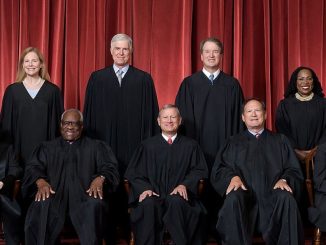
| Published June 19, 2025
🔍 Context & Court Ruling
In a powerful rebuke from the U.S. Supreme Court, Justice Clarence Thomas took direct aim at medical “experts” advocating gender-affirming procedures for minors—labeling such interventions as “mutilation” and warning against blindly trusting professional consensus in deeply contested matters. The remarks came as the Court upheld Tennessee’s ban on puberty blockers and hormone therapy for children, a ruling with nationwide implications. Thomas’s statement signals a broader judicial skepticism toward irreversible medical treatments on minors, especially when promoted under evolving and politically charged science.
During oral arguments and the Court’s opinion, conservative justices, led by Justice Clarence Thomas, sharply criticized both medical professionals and advocacy groups for pushing irreversible procedures on children, describing it metaphorically as “mutilation.” Thomas asserted that courts shouldn’t defer to these “experts” when medical consensus remains unsettled .
🎯 What Justice Thomas Said
-
Thomas lambasted medical authorities who endorse puberty-blocking and hormone treatments for minors, arguing they promote irreversible bodily changes before a child can meaningfully consent.
-
He emphasized that courts must scrutinize such procedures carefully, rather than blindly deferring to professional opinion—especially when permanent alterations are at stake.

People gather in Union Square after the U.S. Supreme Court upheld a Tennessee law banning some medical care for transgender youths in New York City. REUTERS/Kylie Cooper Purchase Licensing Rights
Tennessee Attorney General Jonathan Skrmetti speaks during a press conference as Tennessee state Republican House Majority Leader William Lamberth looks on following the U.S. Supreme Court decision to back a Republican-backed ban in Tennessee on gender-affirming medical care for transgender minors at the Tennessee State Capitol building in Nashville, Tennessee, U.S., June 18, 2025. … Purchase Licensing Rights

Tennessee State Republican Senate Majority Leader Jack Johnson speaks during a press conference as Tennessee State Republican House Majority Leader William Lamberth and Tennessee Attorney General Jonathan Skrmetti look on following the U.S. Supreme Court decision to back a Republican-backed ban in Tennessee on gender-affirming medical care for transgender minors at the Tennessee State Capitol… Purchase Licensing Rights
 Implications
Implications
-
-
Judicial Skepticism Toward Medical Authority
Justice Thomas’s language opens the door for courts to more aggressively question the credibility of medical organizations supporting gender transitions for minors, potentially reshaping how future legal challenges are handled. -
Legal Backing for State-Level Bans
The ruling empowers over two dozen states with similar laws, giving them a firm constitutional foundation to defend bans on gender-affirming care for minors and inspiring additional legislation. -
Heightened Scrutiny in Lower Courts
Judges in future cases may apply stricter standards when reviewing claims about the “necessity” of medical procedures for minors, challenging the influence of major health associations. -
Shifting Public Discourse
Thomas’s framing—calling such treatments “mutilation”—amplifies a moral and cultural argument that resonates with parents and lawmakers concerned about children’s safety, pushing the debate beyond scientific and clinical terms. -
Medical Community Under Pressure
Doctors and professional bodies advocating for gender-affirming care may face growing legal risk, institutional pushback, and public scrutiny in light of the Court’s tone and posture.
-
🔭 Implications for the Future
-
Courtroom Precedent: Future rulings may demand “heightened scrutiny” before minors can access such care, challenging the deference long accorded to medical consensus.
-
Policy Impact: Some state legislatures may push broader bans—while public health authorities and pediatric groups push back, warning of mental health consequences.
-
Medical Oversight: Providers in states with restrictive laws may face increased liability and scrutiny, prompting national reevaluation of standards for youth care.
 Overall Takeaway:
Overall Takeaway:
Justice Clarence Thomas’s strong denunciation of medical experts promoting gender-affirming treatments for minors reflects a deep judicial shift away from deference to medical consensus in contested cultural issues. By equating these procedures to “mutilation,” the Court not only affirmed Tennessee’s right to ban them but also signaled that courts may take a more active role in questioning the ethics and science behind such interventions. This ruling strengthens the legal footing for states restricting such care and reframes the debate around child protection, setting the stage for future legal and ideological battles.




Be the first to comment